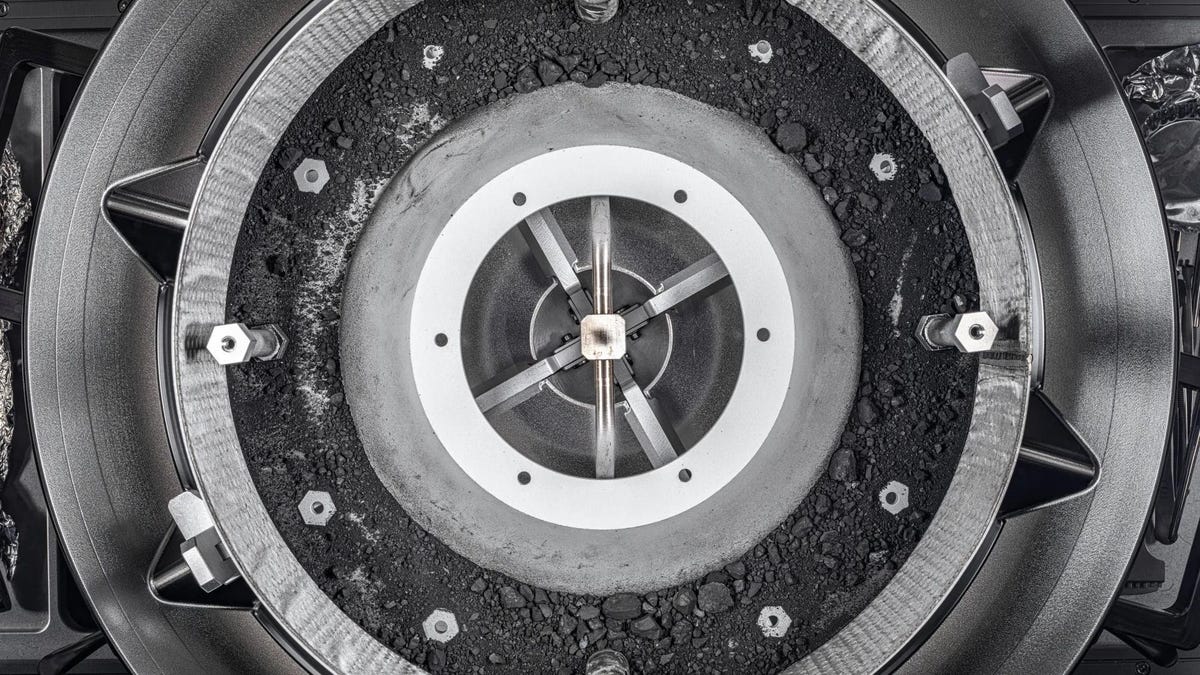
After months of frustration, NASA finally got the Bennu asteroid sample container open in January, revealing the large amounts of asteroid scooped up by the OSIRIS-REx spacecraft. Now, a top member of the mission says the distant hunk of space rock may be a planetesimal—a planet’s building block—that once belonged to an ocean world.
Dante Lauretta, a planetary scientist at the University of Arizona and principal investigator on the OSIRIS-REx mission, told New Scientist that “my working hypothesis is that this was an ancient ocean world.”
Advertisement
While “highly speculative,” as Lauretta told Space.com, that’s what the high levels of phosphates in the Bennu samples are suggesting. Phosphorus is a building block of life and was found last year being spat up by the subsurface oceans on Enceladus, an icy moon of Saturn. Because water is a prerequisite for life as we know it, these ocean worlds are a main target of missions with an eye toward astrobiology, the search for life beyond Earth.
Advertisement
OSIRIS-REx launched in September 2016 and arrived at Bennu, a 4.5-billion-year-old asteroid, in December 2018. The spacecraft schlepped some 200 million miles to get to Bennu, which is a carbon-rich relic from the solar system’s formation. It returned to Earth in September 2023 with about 250 grams of asteroid sample, plus another 70 grams in bonus material found outside of the sample container. The sample is “an astrobiologist’s dream,” according to OSIRIS-REx analyst Daniel Glavin.
Advertisement
What’s so exciting about this mission is that researchers now have access to space material that is unspoiled by the journey through Earth’s atmosphere. Asteroids that fall to Earth as meteorites are heated up by the fall. If they don’t burn up completely, they are transformed by the process, and then tainted by the terrestrial material they fall upon. It can be difficult to trace these meteorites back to their sources in space, whereas scientists plucked the Bennu samples straight from their splendid source.
The Bennu samples have the potential to give us a timeline of solar system formation and reveal more about how life arose from the cosmos’ primordial ether. Bennu is “a fossil snapshot of some of the most primitive material in the solar system,” Michael Wong, an astrobiologist at Carnegie Science, told Gizmodo shortly after the samples arrived on Earth. “But a little bit of time elapsed between its formation and where it essentially froze out and stopped evolving as a planetary body.”
Advertisement
Because of this window of change, Bennu also holds some clues about how similar ancient rocky bodies can evolve. More analysis of the samples—scientists only got the darn canister open last month, after all—will almost certainly reveal much more.
More: Saturn’s Moon Enceladus Is Belching Up a Key Life Ingredient
Services Marketplace – Listings, Bookings & Reviews